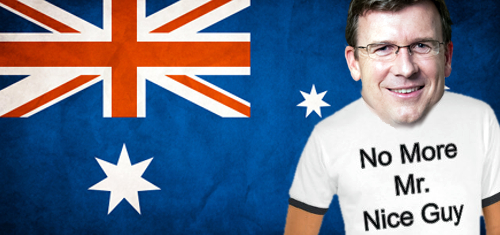 Australia plans to close the legal loopholes that bookmakers have used to offer online in-play sports betting.
Australia plans to close the legal loopholes that bookmakers have used to offer online in-play sports betting.
On Thursday, Human Services Minister Alan Tudge (pictured) released the findings of a review of the Interactive Gambling Act 2001 conducted by former New South Wales premier Barry O’Farrell. The federal government says it has accepted 18 of the report’s 19 recommendations, most of which represent tighter controls on operators. (Read the full report here.)
The IGA restricts in-play sports betting to telephone and retail channels but last year saw William Hill Australia launch an ingenious smartphone app that uses voice recognition technology to circumvent this restriction, and many of Hills down under rivals quickly followed suit.
The O’Farrell report says that until legislators are prepared to do a full revamp of the IGA, “consideration of additional in-play betting product should be deferred” and “legislative steps should be taken to respect the [IGA’s] original intent.”
As yet, none of the operators offering in-play workarounds have withdrawn their products. Speaking to reporters on Thursday, Tudge said he hoped the operators would comply quickly “because we have clearly indicated that we believe they are [operating] against the intent of the law, if not the actual law.”
Sportsbet CEO Cormac Barry said the in-play decision was misguided and represented a victory for internationally licensed operators and the “lazy, old-fashioned monopoly’ operators such as Tabcorp and Tatts Group, both of which had campaigned against allowing online in-play sports wagers.
OTHER RECOMMENDATIONS
O’Farrell’s report also calls for prohibiting online operators from offering punters lines of credit, the development of a national self-exclusion register for problem gamblers, requiring operators to offer customers the ability to set voluntary pre-commitment wagering levels and establishing national standards for online betting advertising, including by social media channels.
The review suggested a raft of new enforcement measures to protect domestic operators from internationally licensed competitors. These include improving and simplifying the definitions of prohibited gambling activities and extending enforcement to cover affiliates, agents and the like.
The report urged the government to work with banks and credit card companies to “identify potential payment blocking strategies” to disrupt the flow of payments to and from international sites.
The report also suggests the Australian Communications and Media Authority (ACMA) “pursue voluntary agreements” with internet service providers and content providers to “block identified sites fostering illegal wagering activity within Australia.” Should ISPs prove reluctant to enter into such agreements, the government should consider “legislative options for applying website blocking.”
NEW STANCE SHIFTS AUSTRALIAN ONLINE MARKET FROM GREY TO BLACK
The government has also been urged to produce “name and shame” lists of international operators – along with their execs and owners – deemed to be operating illegally in Australia. The “use of other Commonwealth instruments” is suggested as a way to “disrupt travel to Australia” by individuals associated with named and shamed sites.
The report suggests allowing the ACMA to issue written alerts to the jurisdictions in which unauthorized operators are licensed and to “implement new (civil) penalties” against operators that continue to serve the Australian market.
This last point could prove problematic for licensed online operators in New Jersey, where regulators recently announced a fairly tolerant approach to licensees who may have dealings in so-called ‘grey’ markets. However, this tolerance came with the proviso that New Jersey-licensed operators weren’t the subject of “affirmative, concrete actions to actively enforce” online gambling restrictions in other markets.
The most obvious example of a company that awkwardly straddles this fence is Amaya Gaming’s PokerStars brand, which operates in both New Jersey and Australia, despite the latter market prohibiting online poker and casino products. As Australia moves to implement its new restrictions, New Jersey regulators will have to consider Stars’ suitability to operate in the state and Amaya will have to choose between Australia and America.
